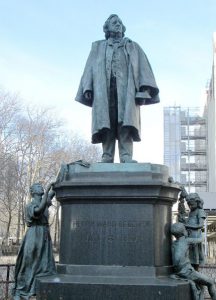Henry Ward Beecher was born on June 24, 1813, in Litchfield, Connecticut. The eighth son of a prominent minister Lyman Beecher, Henry became a celebrated preacher who emphasized God’s love rather than God’s punishment. He died on March 8, 1887, in Brooklyn, New York. Like his father and brothers, he attended Lane Theological Seminary in Cincinnati, Ohio, where his father was president. Beecher’s first parishes were in Lawrenceburg and Indianapolis, both in Indiana. During his tenure, he became a captivating speaker and antislavery activist.
In 1847, Beecher became minister of the newly founded Plymouth Church in Brooklyn, New York. He was describes as possessing an “odd combination of western informality, eastern education, and unabashed showmanship.” These qualities helped lead to his fame and influence.
As tensions increased between North and South in the years leading up to the Civil War, he spoke out against slavery, using his role as minister to spread his views. He staged slave auctions at his church to convince his congregants to donate enough money to buy freedom for enslaved people being sold. In the 1850s, Beecher corralled resources and weapons for the abolitionist settlers engaged in combat to keep the affiliated territories free of slavery. The guns became known as “Beecher’s Bibles,” because they were shipped in boxes labeled “Bibles.” In 1863, Beecher traveled to England to present five speeches about slavery and its abolition. President Abraham Lincoln was so certain that Beecher’s speeches had influenced the outcome of the war that he sent him to Fort Sumter, where the Civil War began, to raise the United States flag after the South surrendered.
Over the years, Beecher supported other reform movements. He aided women’s suffrage and spoke out against the Chinese Exclusion Act of 1882




